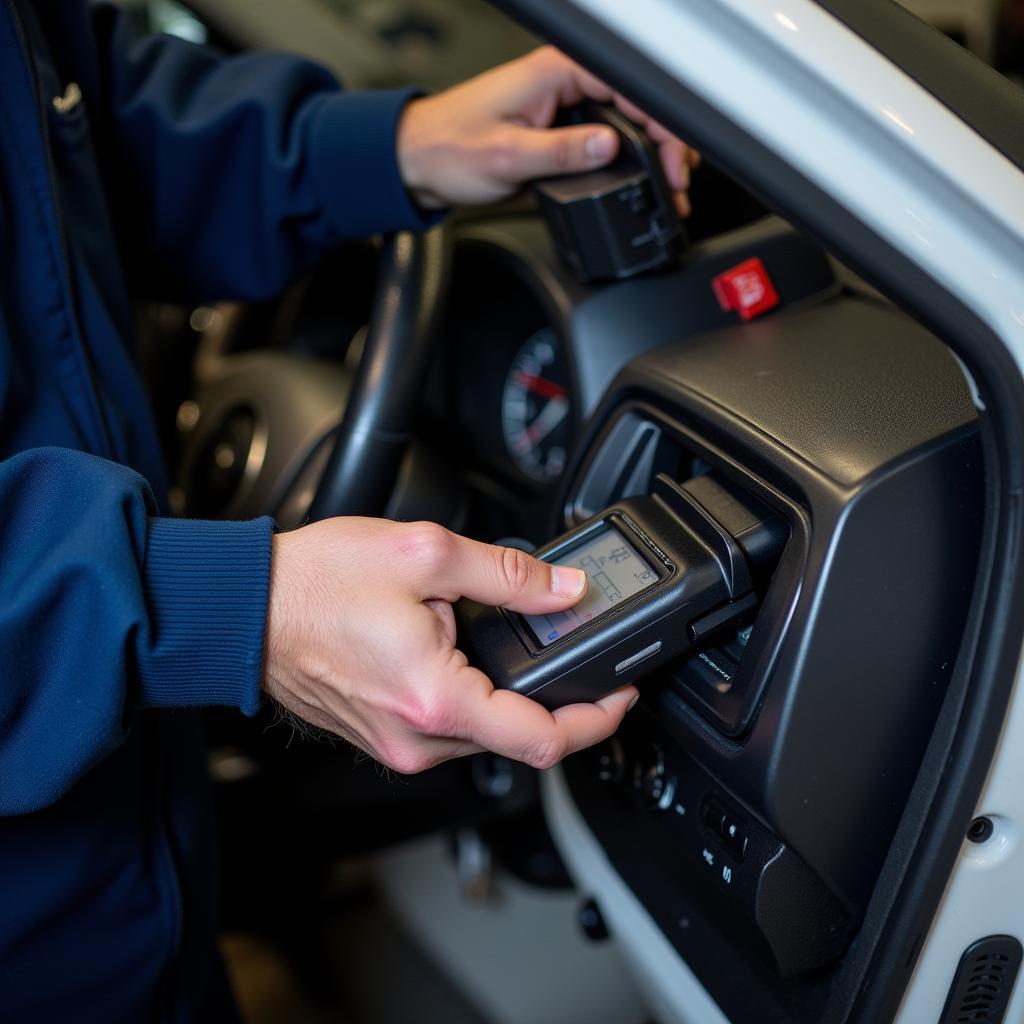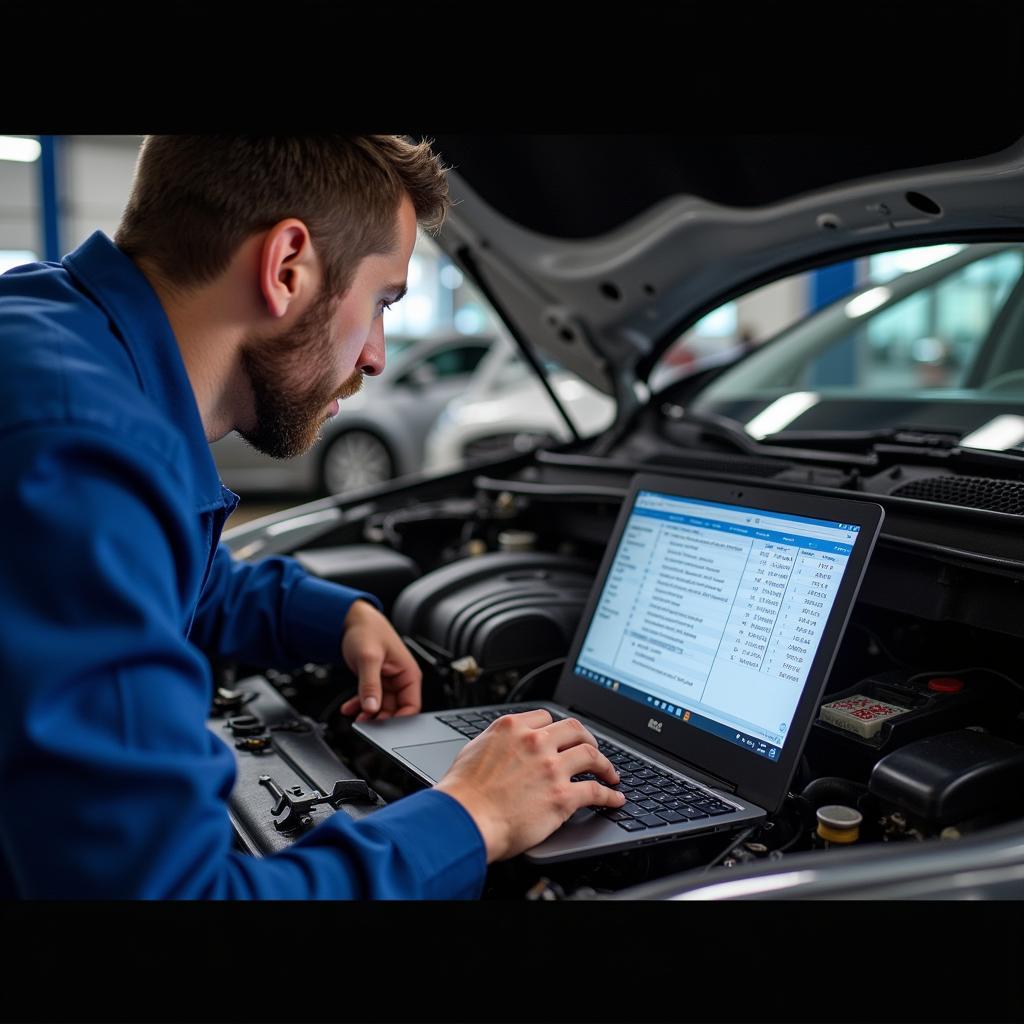In today’s technologically advanced world, cars have evolved to incorporate complex electronic systems. These systems control a myriad of functions, from engine performance and fuel efficiency to safety features and driver assistance. When issues arise within these intricate networks, pinpointing the root cause often requires a specialized approach. This is where a Computer Diagnostic Test For Cars comes into play, offering a vital lifeline for mechanics and car owners alike.
Delving Deeper: How a Car Diagnostic Test Works
A computer diagnostic test on cars leverages advanced technology to communicate with your vehicle’s onboard computer, the Engine Control Unit (ECU). This “brain” of your car continuously monitors various sensors and systems, recording data related to performance, efficiency, and potential malfunctions.
The diagnostic test, performed using a specialized scanner plugged into your car’s OBD-II port, retrieves this stored data. Mechanics can then decipher these digital clues, often presented as Diagnostic Trouble Codes (DTCs), to effectively diagnose the issue at hand.
 Car Diagnostic Test Process
Car Diagnostic Test Process
Why is a Computer Diagnostic Test Crucial?
Gone are the days of relying solely on mechanical expertise and intuition to troubleshoot car problems. The increasing complexity of modern vehicles necessitates a data-driven approach.
Here’s why a computer diagnostic test for cars is indispensable:
- Accurate Diagnosis: By tapping into the ECU’s data logs, the test provides precise information about the problem, eliminating guesswork and unnecessary repairs.
- Time and Cost Efficiency: A swift and accurate diagnosis translates to quicker repairs, saving you both time and money.
- Proactive Maintenance: Regular diagnostic tests can detect minor issues before they escalate into major problems, contributing to the longevity of your vehicle.
- Improved Safety: By identifying and addressing potential safety hazards, diagnostic tests play a vital role in ensuring your safety and that of your passengers.
Beyond the Basics: Unveiling the Power of Diagnostic Tests
The scope of a computer diagnostic test for cars extends far beyond merely retrieving error codes. These tests offer a comprehensive analysis of your vehicle’s health, encompassing:
- Engine Performance: Evaluating parameters such as fuel injection, ignition timing, and emissions control.
- Transmission Function: Analyzing gear shifting, clutch operation, and fluid pressure.
- Brake System: Monitoring ABS functionality, brake fluid levels, and sensor performance.
- Airbag System: Checking the integrity of sensors, modules, and deployment mechanisms.
- Emissions Control: Assessing catalytic converter efficiency and oxygen sensor readings.
 Diagnostic Test Results Displayed on Laptop
Diagnostic Test Results Displayed on Laptop
Choosing the Right Tool: Navigating the World of Car Diagnostic Scanners
The effectiveness of a computer diagnostic test for cars heavily relies on the quality and capabilities of the diagnostic scanner used. While professional-grade scanners offer extensive functionality, numerous options are available for car owners seeking to perform basic diagnostics themselves.
Consider factors such as:
- Vehicle Compatibility: Ensure the scanner supports your car’s make, model, and year.
- Functionality: Determine the level of detail and specific systems you wish to analyze.
- User Friendliness: Opt for a scanner with an intuitive interface and easy-to-understand results.
For those seeking a reliable and user-friendly option, the Streetwize Car Diagnostic Tool Mini offers a great starting point.
FAQs: Addressing Common Queries about Car Diagnostic Tests
Q1: How often should I get a computer diagnostic test for my car?
A: It’s generally recommended to get a diagnostic test annually or whenever your car experiences unusual behavior or warning lights illuminate on your dashboard.
Q2: Can a diagnostic test drain my car battery?
A: While the test itself consumes minimal power, leaving the ignition on for extended periods during the process can potentially drain the battery.
Q3: Are diagnostic tests covered under car warranties?
A: Coverage for diagnostic tests varies depending on the warranty terms. Some warranties may cover specific diagnostic procedures, while others might have limitations.
Q4: Can I perform a computer diagnostic test myself?
A: Yes, with the right diagnostic scanner and some basic knowledge, you can perform basic diagnostics. However, it’s crucial to consult a qualified mechanic for complex issues or repairs.
Expert Insights: Words from the Garage
“Ignoring warning lights or unusual car behavior is like neglecting a fever—it’s crucial to address the issue promptly,” says John Miller, a seasoned automotive technician with over 20 years of experience. “A computer diagnostic test is often the first and most crucial step in accurately diagnosing and effectively resolving car problems.”
Conclusion: Prioritizing Your Car’s Health with Diagnostic Tests
In an era of increasingly sophisticated vehicles, a computer diagnostic test for cars has transitioned from a luxury to a necessity. By embracing this technology, car owners can ensure accurate diagnoses, efficient repairs, and proactive maintenance, ultimately prolonging the life and reliability of their vehicles. Don’t wait for a minor issue to escalate into a major headache—make informed decisions about your car’s health with the power of diagnostics.
Need assistance with car diagnostics or looking for the right tools? Contact us via WhatsApp: +1(641)206-8880, Email: [email protected]. Our team is available 24/7 to provide expert support and guidance.

Leave a Reply